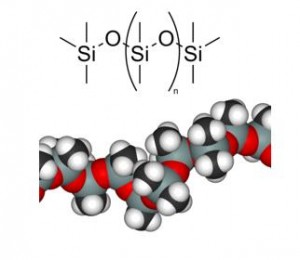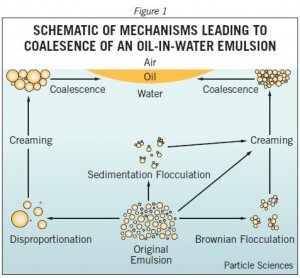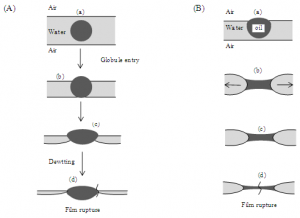Silicone Oils, Emulsions & Antifoams
J Allcock & Sons have been selling silicones to a wide range of industries since the 1970’s. Our last silicones post on 07/11/12 missed out one of our main silicone products and as I have recently started here, I thought it would be a good first topic to write on, with the help of our technical wiz, Norman.
We’d like to go over our 3 main products in the silicone range; Silicone Oils, Silicone Emulsions and Silicone Antifoams. We’ll outline some basic information, uses and grades that J Allcock & Sons offer.
Silicone Oils
Basic Info
Silicone oils are the sensible place to start as all our silicone products are based around silicone oil. silicone oil has many names; some call it Silicone Fluid, Americans tend to call it Dimethicone, while we call it Allcosil 200.
The Scientific name is Polydimethylsiloxane, which is also the most descriptive as the chemistry minded among you can see ‘Poly’ for many, ‘Dimethyl’ for two methyl groups (CH3) and ‘Siloxane’ for Silicone and Oxygen. The resulting structure resembling this:

Taken from: http://www.wou.edu/las/physci/ch462/BouncingPutty.htm
Uses
Thanks to its methyl groups and Si-O backbone, silicone oil is one of the most inert oils around. It’s a water repellent, dielectric, temperature resistant, semi-Newtonian and non-toxic lubricant, which lends itself to uses in the moulding, food packaging, automotive and cosmetics industries.
Our Range
Silicone oils come in a wide array of viscosities, which are dependent on the length of the polymer (the longer the polymer, the more viscose the oil). The different viscosities enable silicone oil to perfectly meet desired needs; Allcosil 200/20 has been used for laboratory heat baths, while Allcosil 200/12,500 can be used as a hydraulic fluid. Silicone oil can come in industrial grade, food grade and cosmetic grade. The common viscosities of Allcosil 200 are 20, 100, 200, 350, 1000, 12,500, and 60,000 (the full range and further information can be seen in our previous blog)
Silicone Emulsions
Basic Info
Silicone emulsions contain 3 components silicone oil, emulsifier and water. The silicone oil provides the desired characteristic, most often lubrication. The emulsifier binds the silicone oil with the third component, water, so that the oil is suspended in solution and can be diluted down easily. The emulsifier-bound oil forms microscopic droplets of a uniform size in the water, which thanks to Brownian motion are kept at roughly an even distance apart.
As long as the droplets remain in this suspension the emulsion will be in good working order, however if the droplets are allowed to rise to the top of the solution (‘Creaming’) form into small clusters (‘Flocculation’) combine into large droplets (‘Coalescence’) or form a continuous layer on the solution’s surface (‘Breaking’) the emulsion will cease to work (see below for a good schematic).
If any of these problems occur, we at J. Allcock & Sons will be able to help solve the problem. We have our own stabilizing agent (Allcosil Stabilizer) that can resolve most emulsion separation issues.

Taken from: http://www.particlesciences.com/news/technical-briefs/2011/emulsion-stability-and-testing.html
Uses
Silicone emulsions are mainly used as a lubricant. One such use is as an anti-nesting agent for the thermoplastic container industry, another as a mould release agent in the rubber industry. Wherever a small amount of silicone oil is needed (usually in ppm) silicone emulsion is the best product.
Our Range
We have a wide range of silicone emulsions available. Allcosil 35 is a 35% silicone oil emulsion suitable for industrial use, while Allcosil 356 and Allcosil 435FG are food grade 35% emulsions. A 60% Silicone oil emulsion suitable for industrial use (Allcosil 60B) may be useful if a smaller dilution is required. We also supply high viscosity oil emulsions, if you wish to use higher centistoke oil in your emulsion (Other emulsions are available) Again our previous blog post has more information on emulsions.
Silicone Antifoam
Basic Info
Antifoams use the intrinsic property of silicone oil to lower water surface tension to pop bubbles and eliminate foam (see below) Silica particles are also present to help pop bubbles through physical piercing.

Taken From: http://journals.sfu.ca/rncsb/index.php/csbj/article/view/csbj.201210014/184
Uses
Silicone antifoams can be used wherever foams form and need to be removed. When solutions are pumped through a high pressure system, soaps are used, or froth is generated by chemical or biological action e.g. in sewage treatment, antifoam can be used to totally remove foam from the solution.
Our Range
As only tiny amounts of silicone are needed for the antifoam effect, J. Allcock & Sons provide two main products, A.011 and Allcosil 30G Antifoam, 10% and 30% silicone based antifoams respectively. We also provide food grade antifoams for the food industry, both 10% and 30% available.
I hope this helps in any Silicone-based queries you may have. If you’d like more information or are interested in any of our products please call myself on +44 (0)161 223 7181
Matt Darlington





